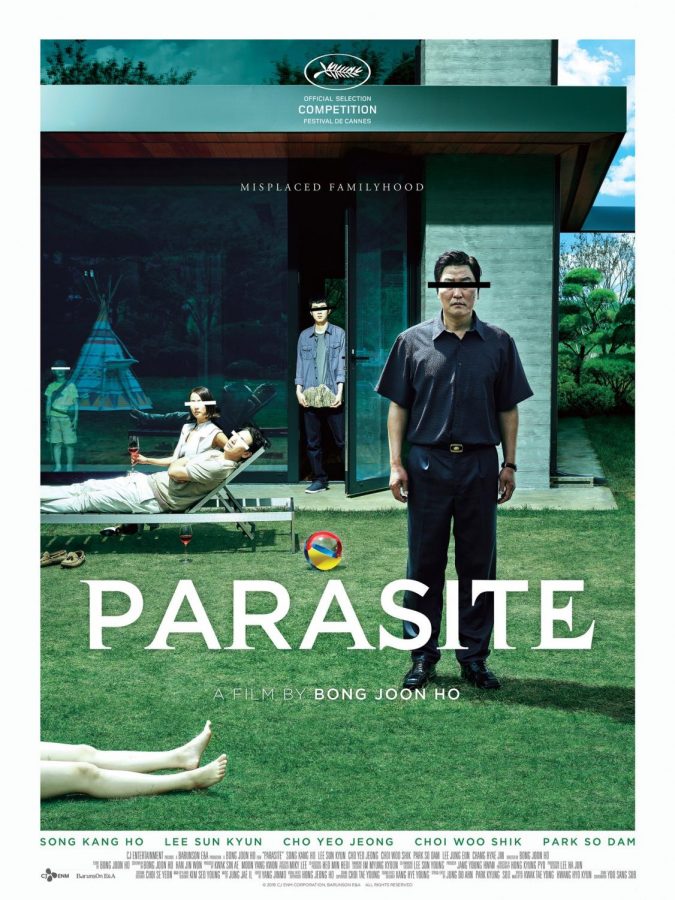Review: “Parasite” is a brilliant, “metaphorical” take on class divisions
January 7, 2020
“Parasite,” the latest film from South Korean auteur Bong Joon-ho, is a wickedly funny, unbearably tense and smartly crafted view on the universal theme of the class divide between the haves and the have-nots.
The film centers on the Kims, a relatively poor family living in their small basement apartment. Led by sedentary patriarch Ki-taek, played by Song Kang-ho, they barely make a living assembling pizza boxes for a delivery company. Their fortunes adapt when the son Ki-woo, played by Choi Woo-shik, secures a job working as an English-language tutor for the wealthy Park family and particularly their teenage daughter Dah-ye, played by Jung Ziso. One by one, the Kim family leeches themselves, like parasites, into the Park household through an effortless blend of charm and deceit. Ki-woo’s sister Ki-jung, played by Park So-dam, becomes the “sophisticated” art teacher to Dah-ye’s eccentric brother Da-song, while Ki-taek becomes the family driver and his wife Chung-sook, played by Jang Hye-jin, becomes the housekeeper.
The general consensus about “Parasite” is that it’s wise to dive into the film without any idea on what it’s about. It has a lot of deftly plotted twists and turns that, at one point, threaten to engulf the Kim family’s newfound place among the Park home. The line between defining heroes and villains in “Parasite” becomes starkly blurred as reality eventually collides with the cunning family in violent, unexpected ways.
But, the audience somehow finds themselves rooting for the Kims. After all, poverty breeds a sense of quick wit in order to survive in an unforgiving world. In this view, the Park family are portrayed as these sheltered beings who are blissfully naive to the brilliant trickery that the Kims have set upon their lovely home. The audience cannot help but delight in the wickedly hilarious sense of comeuppance to this family that lives on a silver spoon, as the Kims successfully ingratiate themselves into their abode.
With “Parasite,” Bong is at the height of his powers. The universal theme of class warfare has always been present in his filmography, from “Snowpiercer” to “Okja.” His new film is a culmination of this potent blend of social inequality, combined with distortion of genre archetypes and Kubrickian black comedy that never fails to entertain and provoke audiences the world over.
Bong’s mastery of the camerawork is stunning. He wants the audience to pay attention to the particular frame that they are seeing, but its overall clever staging foreshadows things to come. It brings to mind fellow Japanese visionary Akira Kurosawa and his skillful use of blocking in many of his works. It makes for great rewatchability, too.
What is brilliant about “Parasite” is that Bong, who wrote the screenplay with Han Jin-won, doesn’t rub it in. He evokes ordinary slices of life to illustrate the “metaphorical” divide between the Kim and Park households. For example, the juxtaposition between their respective abodes is evident, signifying that abundance equates wealth. Where the former is noticeably cramped with its window to the world situated below street level, the latter is very spacious and stunning with rays of sunshine all around. Where Ki-woo and Ki-jung try to locate the elusive Wi-fi signal in their house, (and find it in the bathroom, of course) the Parks are quick to dismiss poor people based on their “old radish” smell. These are just the little things that illustrate the film’s effective way of portraying class divides without making deliberate efforts to preach.
While the film is more than two hours long, it doesn’t make its runtime felt. These two particular hours are pure entertainment that keep the audience invested and engrossed. After a string of disappointing studio franchise entries, “Parasite” will go down in history as cinema’s finest hour in 2019.









